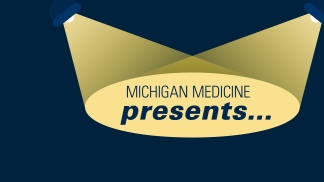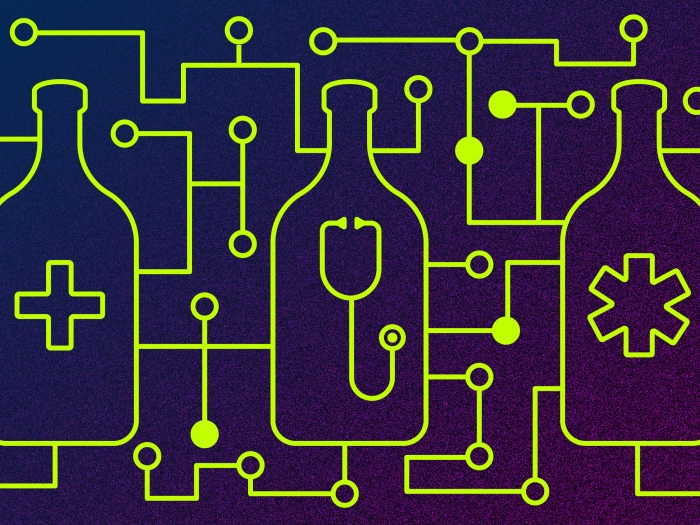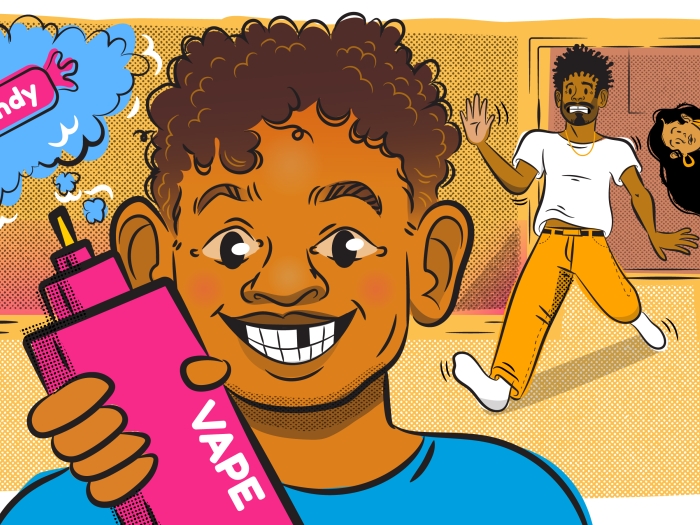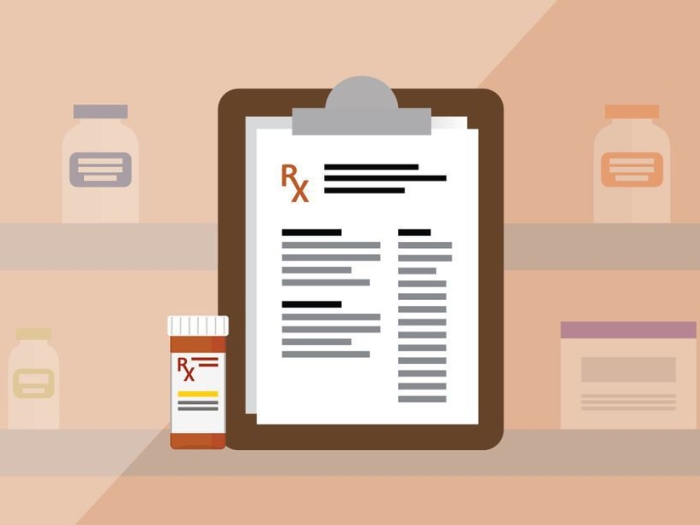Episode 3
Featuring Sarah Rollins, LMSW
Transcript
Introduction (00:10):
Welcome to Michigan Medicine Presents, a wide ranging podcast series that will explore the progress in scientific research and innovation, historic roots, and the current state of conditions that affect us all. Join us for our first series, a three part look into the science of addiction.
Narrator (00:29):
When your partner falls and hurts their leg, you probably don't think twice about encouraging them to get it looked at. When someone at work complains of allergy symptoms, it's not uncommon for someone to quickly jump in with a recommendation for a great allergy specialist. But when you see someone struggling with addiction, well, for many people, what to do next is unclear. Watching someone live with addiction is hard. You may feel helpless. You may feel scared. You may feel angry, but you may be able to help.
Narrator (01:02):
In this episode, we're talking with experts at University of Michigan Health, about how to help someone who is struggling with addiction. In fact, we're talking with a specialist from one of the places that provides exactly this type of help: U-M Addiction Treatment Services.
This is Michigan Medicine Presents, and we are talking about The Science of Addiction. Episode three: Helping Someone Get Help. This is a complicated topic. I think we're going to need an expert.
Sarah Rollins (01:31):
I'm an adolescent and adult therapist, and I work with individuals, groups, and families.
Narrator (01:37):
Perfect. Enter Sarah Rollins, a licensed clinical social worker at University of Michigan Health. Sarah works with adolescents and young adults who have substance use disorders. Let's start with what help looks like. When a lot of people think about helping someone with addiction, they imagine something they've seen maybe on a TV show or in a movie: interventions.
Sarah Rollins (02:00):
So in regards to interventions, I think that the typical view of interventions is like the TV show intervention, where a bunch of family members sit down, they maybe bring an outside person and they just tell the family member who's struggling with addiction, all of the bad things, and they force them to go into treatment. So that is one way, but I like to think about an intervention as a broader topic.
Sarah Rollins (02:24):
So interventions can simply be someone one-on-one sitting with their loved one and expressing their concern. So usually family members are one of the main reasons that people seek out treatment. And so we know that family involvement is really powerful. So I would recommend if you decide that you want an intervention as maybe you see on TV or that you've heard about, to look up some resources. There actually are a lot of resources on how to do a proper intervention, because we know going back to what increases motivation, is that it's kindness and support rather than criticism and yelling. And sometimes interventions, if not done in an appropriate manner can lead to actually more resistance, and people feeling as though they're not supported and their family members are all against them. And that it can actually create a bigger gap between the patient or the person wanting care.
Narrator (03:27):
Okay. Do some research first on how to structure your intervention. That's important, and stay tuned to the end of this episode, because we're going to lay out a bunch of great resources for how to do just that. But back to the intervention. So it's good to have family involved?
Sarah Rollins (03:42):
Yes, 100%. Again, we know that family involvement is one of the main reasons that people seek treatment. And if we can help people identify maybe what their struggles are. So for example, a lot of people struggle with comorbid psychiatric concerns like depression, anxiety, trauma. And so sometimes people really feel that those issues are bigger in their lives than maybe the substance use. And so sometimes starting there and saying, I see you're really struggling with depression or whatever word they describe their mental health concerns as, and then that can help link them to treatment for that, which then maybe will help motivate them to see how their substance use is playing a role.
Narrator (04:30):
So an intervention is one way to help, and it's normal to want to help, to look for different ways to support your loved one. But good intentions aren't always enough. Sometimes help can not be helpful. Sometimes what you think is help might be enabling.
Sarah Rollins (04:47):
So I really like Betty Ford Hazelden's definition of enabling. They say enabling behavior is "Behavior that shields people from experiencing the full impact and consequences of their behavior." And most people engage in enabling behavior out of really good intentions. So for example, an individual may have drove or done something dangerous under the influence, and then a family member will come and take their car away so they don't get caught. And so what happens is, is out of good intention, the family member or friend will allow the person to not have the legal consequences, but then what can happen is the person who engaged in the dangerous behavior may not see the full impact of their behavior. So enabling, as you said, is kind of a hot topic. And one of the most important things is just allowing people to have the natural consequences of their behaviors. And it is very hard. And so that's why sometimes we need supportive counseling or peer support to help us really do that.
Narrator (06:01):
It can be especially hard to know how to help someone who isn't a family member. Family members get into each other's business all the time, but a friend, someone who's not in your biological family, what can you do then?
Sarah Rollins (06:14):
Maybe approaching them in a kind and gentle way and saying, "Hey, I've been noticing that you haven't been feeling well. Would you like to talk?" And reaching out your own hand and maybe not waiting for their family members, but also knowing your own boundaries and limits because that person may just not be ready and that's okay. So really focusing on the fact that again, motivation can be grown and common ways to increase motivation are the person feeling acknowledged, getting information without pressure. So some people feel really pressured to "go to rehab" or something like that. Having different options, having reasons that make sense for them to make that change, having the cofidence to make the change and also getting positive feedback. So although you may not get them straight to where you think they need to be, it's really important that you can increase motivation by doing those things.
Narrator (07:16):
That's a really interesting point. You can help someone who isn't inclined to get help become more motivated to change?
Sarah Rollins (07:23):
Ambivalence is really normal and motivation is not a fixed trait, so it can actually be grown. And one of the ways that we really help families support their loved ones in making a decision is to help them see, from the loved one's perspective, why they might be using. It might be to help with a psychiatric problem such as depression or anxiety. It also might be to cope with trauma. So what we always encourage family members to do is to really take a step back. And this is very hard of course, to take a step back and focus on what is really going on with the individual. And to remember that we don't have to wait to rock bottom, which is a common phrase we use in addiction language, that sometimes problems are actually more treatable early on. And to help family members by responding with kindness and helping them see all their choices, rather than feeling like there's only one treatment option because there's so many, and one size does not fit all.
Narrator (08:28):
Like with so many things, one size does not fit all, but there is one treatment option a lot of people have heard about. Let's talk about 12 step programs. And they're not just for the person who is living with the addiction, are they?
Sarah Rollins (08:42):
Yes. 12 step programs, both for family members and for individuals struggling with addictions can be helpful because it's a place where people can find other people to empathize with them, to feel connected to others and feel as they're not alone. It also is a good way for self-care. We talk about the self-care process for both family members and those struggling with addiction, because it's important to take care of ourselves and focus on what we need.
Narrator (09:10):
Okay, we're going to interrupt here because Sarah made some important points about self-care. Self-care in this case is not as simple as a mani-pedi or treating yourself to something fun. Sarah's referring to a very specific type of self-care.
Sarah Rollins (09:24):
When I talk about self-care, I mean a few things. So first of all, I mean that knowing your boundaries and your limits is really helpful. And sometimes saying “no” or saying “not right now” is actually a way that we can engage in self-care. A lot of times we think about self-care as an act of doing something, like going to yoga or getting a massage, which are all great ways to take care of ourselves. But sometimes by saying no, or by setting boundaries, not to keep people away, but to keep ourselves safe and stable, we're actually able to care for ourselves better.
Sarah Rollins (10:01):
Another way I think about self-care is actually asking for help or support. We know that we can't do everything by ourselves, yet sometimes we feel like the world is on our shoulders. And so sometimes asking people who we trust and we care about to help support us. And it can be very simple ways such as, "Can you drive with me to this appointment? Or can you talk on the phone for a few minutes?" So when I think of self-care, it's not just about what we do, but about what we don't do.
Narrator (10:31):
So find what form of self-care you need to support yourself on this journey. Important for both the person living with the addiction and the person supporting them. Drawing boundaries, knowing your limits, finding the tools that work for you, and that sort of personalized approach to what works for you applies to the addiction treatment itself too.
Sarah Rollins (10:53):
So one thing that I like to mention about any 12 step recovery group is that there's a common phrase that people say, which is “Take what you like and leave the rest.” Which means that just because you hear something in a recovery meeting does not mean that you have to adopt that or that it's right for you. I always encourage people to talk to an individual counselor or someone they trust about any advice that they're not sure of that they've received in a 12 step meeting.
Narrator (11:21):
Find someone to talk to is great advice for the person living with the addiction - and anyone really, and sometimes getting help can be a family affair.
Sarah Rollins (11:31):
Yes, family therapy can be really helpful because it allows family members to speak their truth and gain information about how to best support their loved one. There is evidence that supports family therapy or family involvement improve the odds of recovery. It also helps to increase empathy of the family, which also increases communication.
Narrator (11:52):
It can be especially hard to be the child of someone living with a substance use disorder, but there are special resources for these kids too.
Sarah Rollins (12:00):
There's a great program at Brighton Center for Recovery, and it's actually a free educational healing and addiction prevention program for children aged 7 to 12. And the program is really helpful for children whose parents are struggling with addiction. And they also get to come together with other kids who are experiencing the same thing. There's also Alateen and then individual counseling that are really good resources for children.
Narrator (12:30):
All right, so say you've made some progress, your loved one is getting help. How can you help someone who's in the middle of their recovery journey?
Sarah Rollins (12:38):
The biggest thing I always say is to ask the person and to not assume. So everybody wants and needs something different, and the person may not know what they want or need. And that's okay. So typically I'll ask people, how would you like me to support you? Or would you like me to not drink around you? Or use a certain substance around you?
Sarah Rollins (12:59):
Another way to support a loved one in recovery is to really use positive reinforcement. A lot of times we just expect people to get better. And we don't remember that changing is a lot of work and sometimes it can feel worse before it gets better. And so people really respond to positive reinforcement, really good feedback, offering statements of understanding and offering to help. So even if you ask someone what they want at first and they are not sure, maybe circling back in a week or two, or a month or two and saying, "Hey, I'm still here for you. Would you need anything today? Or this week?"
Narrator (13:41):
Lots of people wonder, “Do I need to change my behaviors around someone who's in recovery?” How much of someone being able to successfully recover from a substance use disorder is about good old fashioned willpower?
Sarah Rollins (13:54):
Willpower is a concept that I really like to educate people about. When we think of willpower, we think of it as, something that we all have an infinite amount of. And if we don't have it, it means we're weak. What we really know about willpower is that we all have a finite amount of willpower, and we use willpower to do things as get out of bed, go to work, spend time with family, parents, our children. And so when people are in recovery, what happens is they still have that same amount of willpower, but then they have more to do. And so sometimes we need support from other people to help us through. So it's not really about willpower. It's about having the resources and the support to cope with a change in our lives. And again, it's really asking the individual what they would like. Some people are really offended when other people change their behaviors. And some people are very appreciative and feel supported when people ask them what they would like them to do in regards to changing their behaviors. So again, it's a really case by case basis.
Narrator (15:06):
And recovery doesn't always work for everyone on the first try. No doubt, you've heard about relapse. What should we know about relapse and addiction?
Sarah Rollins (15:15):
I encourage everybody to think about a time in their lives when they tried to make a change. It might be with their weight. It might be in a relationship. It might be with a job. And think about if you did it perfectly from the first day that you decided to make that change. And most people would say no, that along the way, there were some blips or maybe if it was with weight loss, they decided one day they really wanted to eat that cupcake. And so we want to think about sobriety in the same way. That again, making a change is really hard work, and there's also a lot of underlying psychiatric factors, societal factors and social factors that might lead to making a change be a little bit harder than maybe we anticipated. There's also withdrawal in cravings that can lead to difficulty maintaining sobriety for long periods of time.
Sarah Rollins (16:10):
The last issue that some people aren't really aware of is post acute withdrawal syndrome. It can actually take the brain about six months to two years to recalibrate after being completely sober from substances. The brain will naturally begin to produce endorphins and dopamine, but again, it can take a really long time. And so us being aware of that, especially with family members who are struggling, and maybe educating them that it's not always their fault or about willpower, the brain is really going through a lot of change that we can't always control.
Narrator (16:48):
It's clear that helping someone who is living with addiction is complicated. And we've talked about the importance of getting help, not just expecting willpower to be enough. So let's get to the resources part. Where do you start?
Sarah Rollins (17:01):
So that's a really good question. So in the Metro Detroit area, the Ann Arbor area, you can always call UMATS and you can speak to a clinician or a nurse.
Narrator (17:11):
She's talking about University of Michigan Addiction Treatment Services. They call it UMATS for short.
Sarah Rollins (17:16):
Their number here is 734-764-0231. We do work with families too, whose loved ones aren't ready to get help yet with their addiction or psychiatric problems. So it's a good resource. There's also Families Against Narcotics. There's a FANs organization in Ann Arbor, and there's also other treatment centers such as Home of New Vision and Dawn Farm that also have a lot of resources. Another really good resource is the SAMSHA website. It's S-A-M-S-H-A. They have a lot of good resources for whatever area you're in, in addition to Partnership to End Addiction at drugfree.org. And they actually have a lot of peer coaching support and other support that you might want.
Narrator (18:07):
That was Sarah Rollins in our three part series on The Science of Addiction. For more information about the University of Michigan Addiction Treatment Services, call 734-764-0231, or visit uofmhealth.org/addiction. And don't miss the other two episodes in our series. You can find these and other Michigan Medicine Podcasts at uofmhealth.org/podcasts, or by looking up the Michigan Medicine Podcast Network, wherever you stream your podcasts.
Connect with us
- Learn more about U-M Addiction Treatment Services (UMATS) and the U-M Addiction Center.
- Learn more about the University of Michigan Department of Psychiatry.

Listen to more Michigan Medicine Presents podcasts - a part of the Michigan Medicine Podcast Network.





